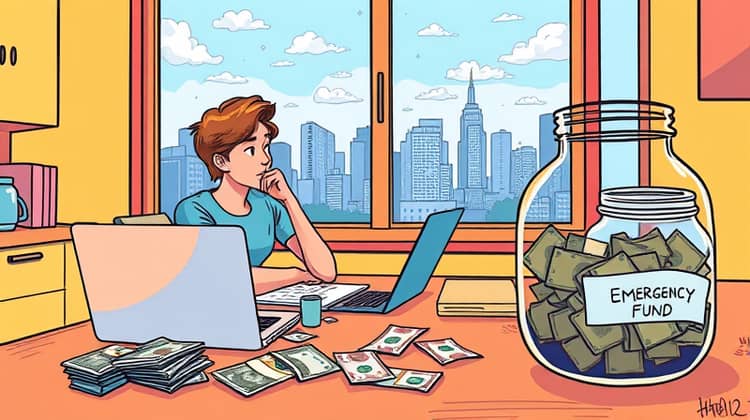Emergency Fund: Essential Reasons Why You Can't Afford to Skip It

An emergency fund is a crucial financial safety net that every individual should prioritize in their financial planning. By setting aside a portion of your earnings, you can create a reserve of funds that can be accessed in times of need. In today's unpredictable world, having an emergency fund is not just a luxury, but a necessity for achieving financial stability and peace of mind.
Many people underestimate the importance of having an emergency fund, often believing they can manage without it. However, relying solely on credit or other means during a financial crisis can lead to further financial complications. Thus, understanding the essential reasons for maintaining an emergency fund can motivate you to start saving immediately.
This article will delve into several key reasons why establishing an emergency fund is essential, providing insights that will help you realize why skipping it is not an option when it comes to financial security. Let's explore these important reasons further.
1. Financial Safety Net

A financial safety net serves as a foundation for your overall financial health. When you have an emergency fund, you can navigate through unforeseen circumstances without derailing your financial stability. This reserve acts as a buffer that protects you from sudden financial shocks that could disrupt your budget and savings plans.
When unexpected costs arise, like car repairs or home maintenance, having money set aside means you don’t have to tap into your long-term savings or rely on credit cards. Instead, you can address the issue promptly and efficiently, which can save you a lot of stress and potential costs in the long run.
Ultimately, having a financial safety net gives you the freedom to take calculated risks, whether that involves job changes, investments, or even pursuing educational opportunities. You know you have a cushion to fall back on in case things don’t go as planned.
2. Unexpected Expenses

Unexpected expenses are a common occurrence in life, and they can put a significant strain on your finances if you're unprepared. These expenses can range from minor issues, like a new appliance breaking down, to major costs such as medical emergencies or vehicle repairs that you cannot predict.
Planning for these unexpected costs is a crucial part of financial management. Having an emergency fund allows you to handle these situations without feeling overwhelmed or making rash financial decisions.
- Car repairs due to an accident or mechanical failure
- Emergency home repairs, such as a leaking roof or plumbing issues
- Unforeseen travel expenses for family emergencies
Having an emergency fund specifically for unexpected expenses can give you the confidence and peace of mind to handle life's surprises head-on. You will have the necessary financial support and security to take action when various urgent situations arise.
3. Job Loss or Income Reduction

One of the most daunting situations many people face is job loss or a reduction in income. In an unpredictable job market, having a financial cushion in the form of an emergency fund can make all the difference during tough times.
- Gives you the time to find a job that suits your skills without financial pressure
- Prevents you from accumulating debt when your income is reduced
With an emergency fund, you can sustain your regular expenses while searching for new employment or a side gig to supplement your income. It serves as a financial relief measure during your job search.
4. Medical Emergencies

Medical emergencies can arise unexpectedly and often come with significant costs. Whether it's a sudden illness, an accident, or even routine medical procedures that are not fully covered by insurance, the financial burden can be substantial. Having an emergency fund specifically earmarked for medical situations provides a safety net that ensures you receive the necessary care without stressing about the costs.
Furthermore, the financial impacts of medical emergencies can last longer than the immediate event. The ability to cover these unforeseen expenses can prevent you from dipping into retirement funds or other essential savings. This foresight is vital in managing both health and financial risk effectively.
By preparing for potential medical issues with an emergency fund, you can focus on your health and recovery without the added worry of financial strain. You can take comfort in knowing that you will not be forced into debt due to necessary medical care.
5. Peace of Mind

Having an emergency fund reduces anxiety and offers profound peace of mind regarding your financial situation. Knowing that there's a buffer available for emergencies allows you to feel secure and confident in your ability to handle unexpected events. You are less likely to panic during crises, as you have prepared yourself financially.
This peace of mind is not just emotional; it can also improve your mental well-being. When financial worries are minimized, you can focus on other areas of your life, such as your career, family, and personal development. The overall sense of security leads to a more balanced and fulfilling life, free from excessive financial stress.
Moreover, peace of mind goes hand-in-hand with better decision-making. You can make important life choices without the overwhelming fear of potential financial fallout, empowering you to pursue opportunities that align with your goals and values.
6. Avoiding Debt

One of the most significant benefits of an emergency fund is its role in preventing unnecessary debt. Without such a reserve, many people have no choice but to rely on credit cards or loans when emergency expenses arise, potentially leading to further financial hardships.
By relying on your emergency savings during crises, you reduce the risk of increasing your debt load and establish a more stable financial future.
- Prevents reliance on high-interest loans
- Keeps credit card usage in-check during emergencies
- Mitigates the risk of falling into a debt cycle
In essence, an emergency fund shields you from accumulating debt while simultaneously providing a foundation for healthier financial practices in your life.
7. Opportunities for Investment or Growth

Having an emergency fund doesn't just cover your essential needs; it also opens doors for potential investment opportunities or personal growth. With a solid financial base, you might consider taking calculated risks that can lead to significant rewards. This could involve starting a side business, investing in the stock market, or even pursuing further education that could boost your career.
When you’re not worried about covering immediate expenses, you can focus your energy on long-term growth and development. An emergency fund allows you to take actions that you might otherwise consider too risky. Essentially, it creates a safety net that encourages you to pursue opportunities that can contribute to your overall financial health.
- Start a side business with financial security.
- Invest in education or skill development to increase earning potential.
- Explore stocks or real estate as a long-term growth strategy.
Ultimately, having an emergency fund not only insulates you from unforeseen issues but also empowers you to make decisions that can lead to significant advances in your financial landscape. Transforming potential risks into growth opportunities is a luxury afforded by those who have prepared themselves with an emergency fund.
8. Setting a Positive Financial Example

Establishing an emergency fund sets a positive example for those around you, especially younger generations who are learning about financial management. By demonstrating the importance of such financial practices, you cultivate a mindset about savings and preparedness that can resonate through your family or social circle. The lessons learned in the home can have long-lasting effects on how future generations manage their finances.
Furthermore, being an example of financial prudence can inspire others to follow suit, leading to a more financially savvy community overall. As you practice and highlight the importance of emergency funds, you can also promote discussions around budgeting, saving, and thoughtful financial planning.
By setting this precedent, you contribute to a culture of financial responsibility and awareness—helping to ensure that those around you are better equipped to handle their financial futures.
How Much Should You Save?

When it comes to saving for an emergency fund, experts often recommend aiming for three to six months' worth of living expenses. This amount can vary based on your personal circumstances, such as job stability, lifestyle, and the size of your family.
Regardless of the amount you choose to save, the essential aspect is starting somewhere and growing it over time. Regular contributions, no matter how small, can add up and significantly enhance your financial security.
- Evaluate essential monthly expenses to determine a target fund size.
- Take into account potential extra expenses that may arise.
- Consider setting up automatic transfers to your savings account.
Over time, continue to reassess your emergency fund needs as your life circumstances change. Ensuring that your safety net grows with you is a vital part of maintaining financial security.
Conclusion

In conclusion, establishing an emergency fund is a vital aspect of personal finance that provides numerous benefits, ranging from financial security to peace of mind. Whether you’re preparing for unexpected expenses, ensuring you have a safety net during job loss, or simply providing yourself and your family with a more secure financial futures, the importance of an emergency fund cannot be overstated.
Now is the perfect time to reflect on your financial situation and start prioritizing the creation of an emergency fund if you haven't already. With commitment and diligence, you can cultivate financial stability and gain the confidence to face whatever life throws your way.






